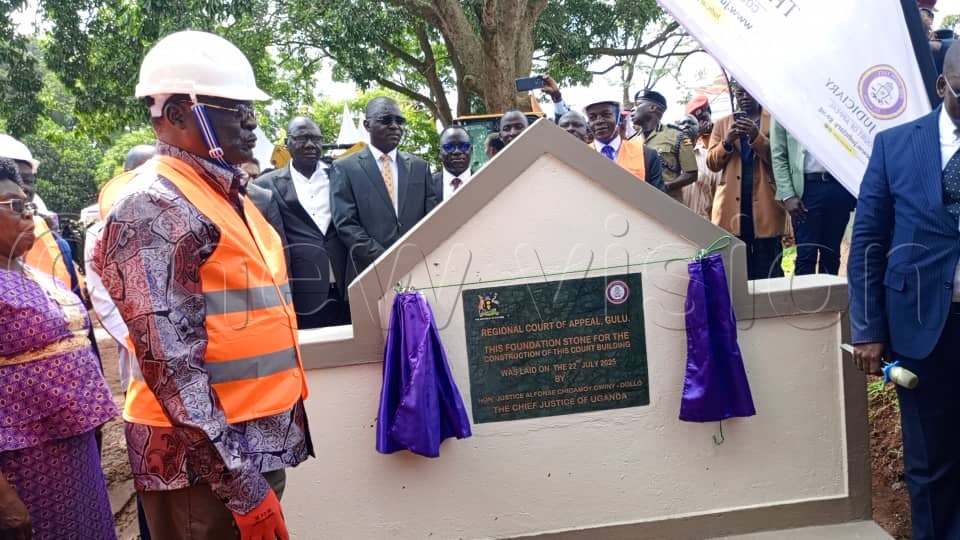Gulu-based sh30b regional Court of Appeal construction starts
During the breaking of the grounnd ceremony, Owiny-Dollo said the development is a significant milestone in the evolution of the Judiciary.
Chief Justice Alphonse Owiny-Dollo launching the construction of a shillings 30 billion northern region Court of Appeal in Gulu city. (Photos by Christopher Nyeko)
________________
In a move expected to enhance justice in the country, Chief Justice Alphonse Owiny-Dollo has officially launched the construction of a shillings 30 billion northern region Court of Appeal in Gulu city.
The July 22, 2025, ceremony was marked by the symbolic unveiling of a foundation monument, a ceremonial breaking of the ground and the planting of trees on the site designated for the building.
The event brought together key figures from the justice and constitutional affairs ministry, representatives of the Judiciary, and officials from the Directorate of Public Prosecutions, all united in their commitment to enhancing the country’s judicial infrastructure.
Judiciary undersecretary Maureen Kasande represented Pius Bigirimana, the permanent secretary and secretary to the Judiciary.
She provided insights into the project, explaining that the construction will be undertaken by a joint venture involving Seyani Brothers and Company (U) Ltd and Parbat Siyani Construction Ltd.
The project promises to feature state-of-the-art courtrooms designed to accommodate the needs of judges and legal practitioners. Alongside the courtrooms, it will include chambers for justices, as well as essential amenities such as a gym, restaurant and conference rooms, all crafted to create a conducive environment for legal proceedings.
The interior design and furnishings will ensure that both aesthetics and functionality are prioritised in the court halls and associated spaces.
The construction work is set to be completed within 18 months, with an anticipated finish in the fiscal year 2026-2027.
During the breaking of the grounnd ceremony, Owiny-Dollo said the development is a significant milestone in the evolution of the Judiciary, saying the project will 'make access to justice more readily available to the local community, thereby bridging the gap previously faced by many'.
“We envisioned establishing two Court of Appeal facilities in each region, but due to financial limitations, we are launching this one in Gulu and will later build another in Arua,” he said, outlining a future with greater accessibility to judicial services.
In the western region, similar facilities are expected to be constructed in the cities of Mbarara and Fort Portal, while the central region will be served by courts in Masaka and Mubende. For the eastern region, new courts will rise in the cities of Mbale and Jinja.
Owiny-Dollo noted that this construction endeavour follows a meaningful discussion he had with President Museveni in 2021, during which he presented a comprehensive proposal for a budget of shillings 800 billion aimed at revolutionising judicial services throughout Uganda.
He further acknowledged the invaluable support from the leadership of the Gulu district local government, who generously provided the land for this significant project.

Gulu High Court resident judge Philips Odoki said this new court will bring justice to local litigants.
Many residents of Gulu found themselves struggling to navigate the lengthy journey to the Court of Appeal in Kampala, burdened by transportation costs and the stress of extended travel.
“Now, litigants who are dissatisfied with our decisions can address their grievances directly here,” Odoki said.
“We anticipate an improvement in the quality of legal services, as experienced lawyers from Kampala and other regions will engage with our local attorneys.”
Economically, the establishment of the Court of Appeal is poised to invigorate business in Gulu, stimulating growth and development in the area.
This initiative aligns with the Judiciary’s visionary agenda for transformation, which focuses on enhancing infrastructure, developing human resources, and digitising court facilities, all driven by the belief that “justice delayed is justice denied.”
Gulu city Woman Member of Parliament Aol Betty Ocan called for local content, urging the contractor to prioritise hiring local labour and utilising materials sourced from the surrounding communities.
Retired Supreme Court Justice Galdino Okello Moro also encouraged Owiny-Dollo to consider the regionalisation of the Supreme Court, a move that could further enhance access to justice.
The Uganda Court of Appeal, established following the 1995 Constitution and the 1996 Judicature Statute, serves as the second-highest court in the country.
It plays a critical role in handling appeals from the High Court and other subordinate courts and serves as the Constitutional Court for constitutional matters.
The court is officially constituted when presided over by an odd number of at least three justices, ensuring a fair and balanced judicial process.
The judiciary has previously adopted regional sittings to effectively address the challenges of case backlogs and bring justice closer to communities that face barriers accessing the central court in Kampala.